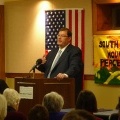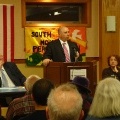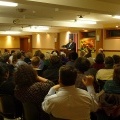FOR IMMEDIATE RELEASE
Contact Information: Hussein Ibish
March 30, 2010 - 12:00am
 ATFP Senior Fellow Hussein Ibish joined Ori Nir of Americans for Peace Now in a panel discussion hosted by the South Mountain Peace Action of Maplewood and South Orange, NJ, on Wednesday, March 24, 2010. Ibish focused on the current confrontation between the Obama administration and the Israeli government over settlements and other issues. He told the audience of over 80 at the Maplewood Memorial Library, "this is a real crisis, and an extremely serious one, but it's a political crisis between politicians and governments, and not a strategic crisis between countries." Ibish said the reason for the confrontation was the enormous difference of opinion between the Obama and Netanyahu governments over issues including Jerusalem, settlements and the role the conflict plays in broader strategic issues. He said he thought the conflict was "inevitable" and would probably happen again as long as these differences remain unaddressed and unresolved.
ATFP Senior Fellow Hussein Ibish joined Ori Nir of Americans for Peace Now in a panel discussion hosted by the South Mountain Peace Action of Maplewood and South Orange, NJ, on Wednesday, March 24, 2010. Ibish focused on the current confrontation between the Obama administration and the Israeli government over settlements and other issues. He told the audience of over 80 at the Maplewood Memorial Library, "this is a real crisis, and an extremely serious one, but it's a political crisis between politicians and governments, and not a strategic crisis between countries." Ibish said the reason for the confrontation was the enormous difference of opinion between the Obama and Netanyahu governments over issues including Jerusalem, settlements and the role the conflict plays in broader strategic issues. He said he thought the conflict was "inevitable" and would probably happen again as long as these differences remain unaddressed and unresolved.

Ibish said that Palestinians had gained considerable advantage due to the confrontation, especially regarding the role of permanent status issues in upcoming proximity negotiations. He told the audience that all reports indicate that Prime Minister Netanyahu had agreed to include permanent status issues, including Jerusalem, in the upcoming talks and not just procedural questions. He said this was a palpable success for both the Obama administration and for the Palestinians, since it would clearly establish the centrality of all permanent status issues to the negotiations. He added that since the American view appears to be closer to the Palestinian position than the Israeli one, Palestinian negotiators have the opportunity of getting closer to the United States by adopting a constructive, cooperative approach that seeks to create a contrast with probable resistance by Israeli diplomats.
 Ibish also focused on the Palestinian state and institution building agenda, saying that while it was important for talks to resume and that he hoped they would make progress, he did not expect any major breakthrough in the next 12 months. Because of this, Ibish said, "the state and institution building program is probably where the action is going to be for the immediate future." He said Palestinians were hoping to create "a convergence of momentum for peace between the bottom-up state and institution building plan and the top-down negotiations that could produce a breakthrough in the future." He urged the audience to regard the program as "the Palestinian answer to settlements, unilateral changes on the ground, but in this case ones that are constructive, conducive to peace, consistent with international law, and don't violate anyone's human rights or legitimate fundamental interests." He urged the audience to promote awareness of the plan interpersonally and through the media, to contact their Congress people and urge them to support the program and, for those who have the means, to invest in businesses, public-private partnerships or other economic development and institution building projects in the occupied Palestinian territories.
Ibish also focused on the Palestinian state and institution building agenda, saying that while it was important for talks to resume and that he hoped they would make progress, he did not expect any major breakthrough in the next 12 months. Because of this, Ibish said, "the state and institution building program is probably where the action is going to be for the immediate future." He said Palestinians were hoping to create "a convergence of momentum for peace between the bottom-up state and institution building plan and the top-down negotiations that could produce a breakthrough in the future." He urged the audience to regard the program as "the Palestinian answer to settlements, unilateral changes on the ground, but in this case ones that are constructive, conducive to peace, consistent with international law, and don't violate anyone's human rights or legitimate fundamental interests." He urged the audience to promote awareness of the plan interpersonally and through the media, to contact their Congress people and urge them to support the program and, for those who have the means, to invest in businesses, public-private partnerships or other economic development and institution building projects in the occupied Palestinian territories.
TAGS:
















